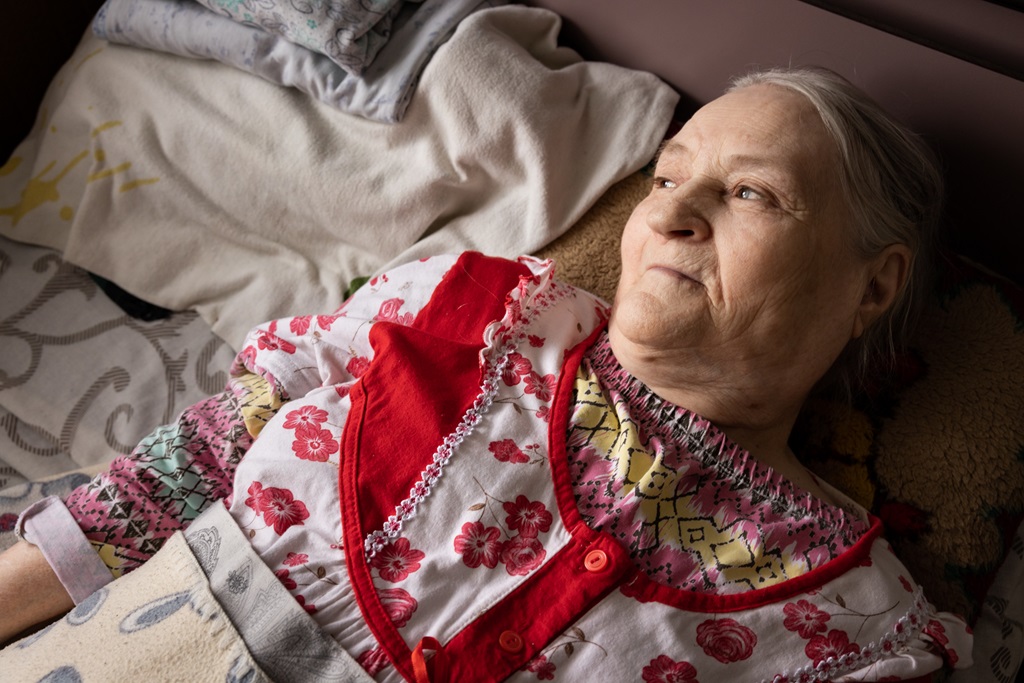Deaconess Foundation and its partners have assisted over 130,000 Ukrainians
14.11.2024
A report by the Deaconess Foundation shows that the emergency assistance provided by the Foundation and its partners has reached Ukrainians in the most vulnerable situations. Combining long-term human rights work with emergency relief makes it possible to promote the rights of discriminated minorities even in times of war.

Leila, 12, and her family were evacuated from Vuhledar, Eastern Ukraine, at the end of March 2022. The apartment building where they lived has now been destroyed by shelling. Leila lives with her family and her cat Kira in emergency accommodation established with funds raised by the Deaconess Foundation in Mukachevo. “The best thing here is that there are no bombs,” says Leila. Photo: Meeri Koutaniemi
The lives of millions of people in Ukraine changed radically when Russia launched a full-scale war in February 2022. The biggest crisis to hit Europe since the Second World War made many want to help.
The Deaconess Foundation also began exploring how best to support Ukrainians from the very beginning of the war. When it was confirmed that the staff of the Foundation’s long-time Ukrainian partner, the Roma Women’s Fund Chiricli, were safe and preparing to respond to the acute needs of the people, it was clear that the Foundation would channel aid through them.
Because the most vulnerable groups, such as members of the Roma minority and people with disabilities, were often left without the help they needed when the crisis struck, the Deaconess Foundation and its partners wanted to help them in particular. More than 130,000 people have received food, medicine, shelter, counselling or other assistance through the emergency response, which began in March 2002.
At the same time, efforts have been made to continue the work done before the war to improve the position of the discriminated Roma minority.
“It is important for us to build a sustainable future despite the war. That’s why we try to combine humanitarian aid and development cooperation in our work,” explains Maija Hyle, Director of Non-Profit Operations at the Deaconess Foundation. “While we help in crisis situations, we try to influence social structures so that the rights of minorities are also realised.”
Aid brings hope amidst crisis
The report on the emergency aid and assistance provided to Ukrainians by the Deaconess Foundation and its partners in 2022-2024 shows that aid specifically targeted to people in the most vulnerable situations has significantly alleviated their situation in the crisis. The work has mitigated the effects of the war and brought hope.
The aid has effectively reached those in need because the Roma Women’s Fund Chiricli has a network of local Roma organisations and Roma mediators operating in different parts of Ukraine. The local actors in the network are well aware of the needs of people living in the surrounding areas, and those in need can easily contact them.
“Building bridges between local organisations and activists and international aid organisations and crisis authorities has also been crucial in effectively helping people in difficult situations,” says Anca Enache, Human Rights Expert at the Deaconess Foundation.
Kateryna received support to evacuate and survive as a refugee
Russia captured Kateryna’s home town of Melitopol in the early days of the war. Kateryna and her three children lived in difficult conditions at home for another four months, but eventually decided to flee to a safer place.
As Kateryna didn’t have a car and public transport was out of action, she had to rely on the help of private individuals who were leaving the city. She had to pay more than 20 times the pre-war price for the trip. The first attempt to escape was unsuccessful, as the transport had to return because of gunfire. A few days later, Kateryna and her children finally made it to safety in the city of Zaporizhzhya.
The Roma Women’s Fund Chiricli helped Kateryna with evacuation costs. She also received food and hygiene products for her family from Roma mediators in Zaporizhzhya.
War refugees need various forms of assistance

Domnikia Constantinova has difficulty walking and sitting for more than a few moments at a time. She comes from the town of Kryvyi Rih, which was heavily bombed by Russia, especially in the early stages of the war. Unable to move to a bomb shelter, Constantinova had to flee her home. Transport was arranged through the Red Cross, but temporary accommodation for both Constantinova and her daughter caring for her was hard to find. Fortunately, a place was found in a shelter run with emergency funds by Deaconess Foundation partner Moldsolidaritate in Greblesti, Moldova. Photo: Meeri Koutaniemi.
In addition to providing food, evacuation and shelter, other forms of assistance have been arranged for internally displaced persons.
Those forced to flee their homes to safer areas have often been able to take only the most essential items with them. Many need hygiene products, winter clothing and childcare items after being granted asylum, or assistance to buy medicines or firewood.
Some 30,000 Roma in Ukraine are not registered in any state system. As support for internally displaced persons is not available without a legal identity, the undocumented have been helped to register in state systems.
Effective work requires cooperation and flexibility
In addition to providing emergency relief to internally displaced persons and people in vulnerable position in Ukraine, the Deaconess Foundation continues to support its partner organisations in their work to realise the human rights of minorities.
With support from the Deaconess Foundation, the Roma Women’s Fund Chiricli has developed its cooperation with international organisations as well as state and local authorities to monitor and report on war crimes and human rights violations, to build a more just society, and to promote Roma participation in decision-making.
Long-term support for discriminated communities and, on the other hand, flexible work based on needs are essential on the path towards a society where everyone is equal.
“Providing psychological support to those affected by the war is also important. That’s why the Deaconess Foundation is active in a Nordic foundation that plans to establish a hospital and research unit in Ukraine specialising in child war trauma. The need for psychological support will continue for years after the end of the war,” says Maija Hyle.
Due to the emergency aid provided by the Deaconess Foundation and its local partners:
-
- 71,180 people received food aid
- 2,635 people received evacuation assistance
- 52,700 people received advice on evacuation, martial law and/or access to state and municipal humanitarian aid
- 445 IDPs (100 Roma women and 345 children) received psychological support
- Shelter was provided for 600 internally displaced Roma refugees in Ukraine
- 1,551 Ukrainian refugees who fled to Moldova were offered shelter
- 2 000 people accessed daytime heating points
- 90 children received art therapy
- 150 undocumented Roma were helped to register with state systems, obtain new identity documents or obtain IDP status
- 1,500 people in difficult situations received financial or other support
The Deaconess Foundation and the Roma Women’s Fund Chiricli, in cooperation with the office of the Ukrainian Parliamentary Commissioner for Human Rights, have drawn on their experience to develop recommendations based on their experiences for the inclusion of the Roma minority in humanitarian aid work and development cooperation in Ukraine.
Further information: Maria Dorofte, Program Coordinator, maria.dorofte@hdl.fi